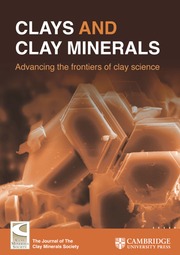Crossref Citations
This article has been cited by the following publications. This list is generated based on data provided by
Crossref.
Bishop, Janice L.
and
Pieters, Carlé M.
1995.
Low‐temperature and low atmospheric pressure infrared reflectance spectroscopy of Mars soil analog materials.
Journal of Geophysical Research: Planets,
Vol. 100,
Issue. E3,
p.
5369.
Chatterjee, A.
Iwasaki, T.
Ebina, T.
and
Hayashi, H.
1996.
Relationship between infrared spectra and isomorphous substitution in smectites: A computer simulation study.
Journal of Molecular Graphics,
Vol. 14,
Issue. 5,
p.
302.
Calvin, Wendy M.
1997.
Variation of the 3‐μm absorption feature on Mars: Observations over eastern Valles Marineris by the Mariner 6 infrared spectrometer.
Journal of Geophysical Research: Planets,
Vol. 102,
Issue. E4,
p.
9097.
Karakassides, M. A.
Petridis, D.
and
Gournis, D.
1997.
Infrared Reflectance Study of Thermally Treated Li- and Cs-Montmorillonites.
Clays and Clay Minerals,
Vol. 45,
Issue. 5,
p.
649.
Myneni, Satish C.B.
Traina, Samuel J.
Waychunas, Glenn A.
and
Logan, Terry J.
1998.
Vibrational spectroscopy of functional group chemistry and arsenate coordination in ettringite.
Geochimica et Cosmochimica Acta,
Vol. 62,
Issue. 21-22,
p.
3499.
Janeba, D.
Ćapková, P.
and
Schenk, H.
1998.
Molecular simulations of Zn-montmorillonite.
Clay Minerals,
Vol. 33,
Issue. 2,
p.
197.
Bishop, Janice L.
Fröschl, Heinz
and
Mancinelli, Rocco L.
1998.
Alteration processes in volcanic soils and identification of exobiologically important weathering products on Mars using remote sensing.
Journal of Geophysical Research: Planets,
Vol. 103,
Issue. E13,
p.
31457.
Köster, H. M.
Ehrlicher, U.
Gilg, H. A.
Jordan, R.
Murad, E.
and
Onnich, K.
1999.
Mineralogical and chemical characteristics of five nontronites and Fe-rich smectites.
Clay Minerals,
Vol. 34,
Issue. 4,
p.
579.
Petit, S.
Madejová, J.
Decarreau, A.
and
Martin, F.
1999.
Characterization of Octahedral Substitutions in Kaolinites Using Near Infrared Spectroscopy.
Clays and Clay Minerals,
Vol. 47,
Issue. 1,
p.
103.
Pelletier, M.
Michot, L. J.
Barrès, O.
Humbert, B.
Petit, S.
and
Robert, J.-L.
1999.
Influence of KBr conditioning on the infrared hydroxyl-stretching region of saponites.
Clay Minerals,
Vol. 34,
Issue. 3,
p.
439.
Madejová, J.
Bujdák, J.
Petit, S.
and
Komadel, P.
2000.
Effects of chemical composition and temperature of heating on the infrared spectra of Li-saturated dioctahedral smectites. (II) Near-infrared region.
Clay Minerals,
Vol. 35,
Issue. 5,
p.
753.
Sadek, Olfat M
and
Mekhamer, Wafaa K
2000.
Ca-montmorillonite clay as thermal energy storage material.
Thermochimica Acta,
Vol. 363,
Issue. 1-2,
p.
47.
de la Fuente, Sandra
Cuadros, Javier
and
Linares, José
2000.
Quantification of Mixed-Layer Illite-Smectite in Glass Matrices by Fourier-Transform Infrared Spectroscopy.
Clays and Clay Minerals,
Vol. 48,
Issue. 2,
p.
299.
Breen, C.
Clegg, F.
Hughes, T. L.
and
Yarwood, J.
2000.
Thermal and Spectroscopic Characterization of N-Methylformamide/Ca-, Mg-, and Na-Exchanged Montmorillonite Intercalates.
Langmuir,
Vol. 16,
Issue. 16,
p.
6648.
Harloff, J.
and
Arnold, G.
2001.
Near-infrared reflectance spectroscopy of bulk analog materials for planetary crust.
Planetary and Space Science,
Vol. 49,
Issue. 2,
p.
191.
Morris, R. V.
Golden, D. C.
Ming, D. W.
Shelfer, T. D.
Jørgensen, L. C.
Bell, J. F.
Graff, T. G.
and
Mertzman, S. A.
2001.
Phyllosilicate‐poor palagonitic dust from Mauna Kea Volcano (Hawaii): A mineralogical analogue for magnetic Martian dust?.
Journal of Geophysical Research: Planets,
Vol. 106,
Issue. E3,
p.
5057.
Sadek, Olfat M.
and
Mekhemer, Waffa K.
2001.
Na-montmorillonite clay as thermal energy storage material.
Thermochimica Acta,
Vol. 370,
Issue. 1-2,
p.
57.
Madejová, Jana
and
Komadel, Peter
2001.
Baseline Studies of the Clay Minerals Society Source Clays: Infrared Methods.
Clays and Clay Minerals,
Vol. 49,
Issue. 5,
p.
410.
Breen, C.
Clegg, F.
Hughes, T. L.
and
Yarwood, J.
2001.
Distinguishing Interlayer Cations in Montmorillonite by Thermal Analysis of Dimethylformamide-Saturated Samples.
The Journal of Physical Chemistry B,
Vol. 105,
Issue. 21,
p.
4872.
Cloutis, Edward A.
Asher, Pranoti M.
and
Mertzman, Stanley A.
2002.
Spectral reflectance properties of zeolites and remote sensing implications.
Journal of Geophysical Research: Planets,
Vol. 107,
Issue. E9,

